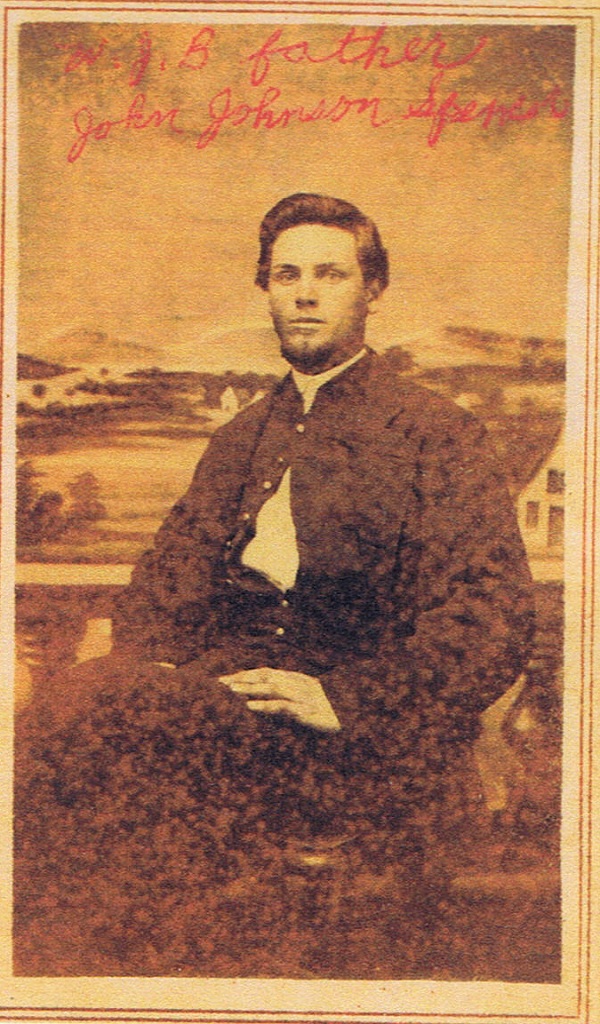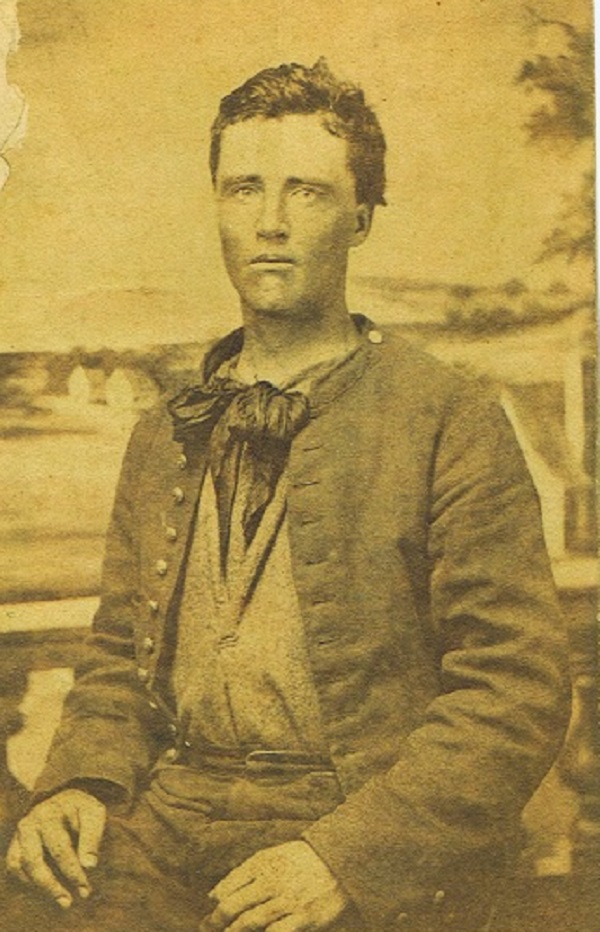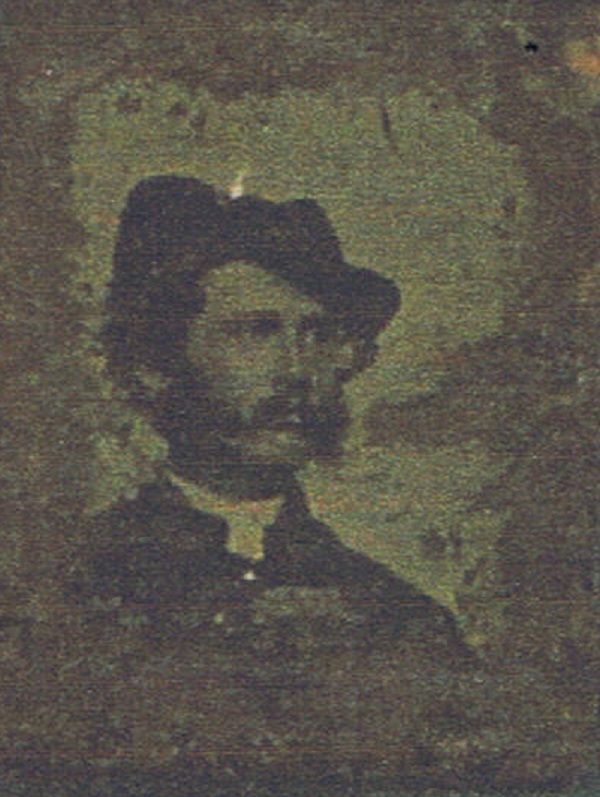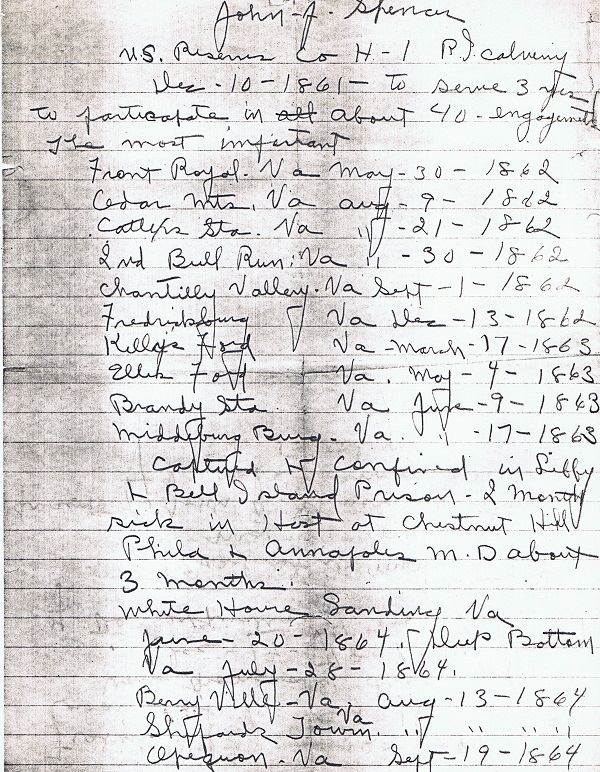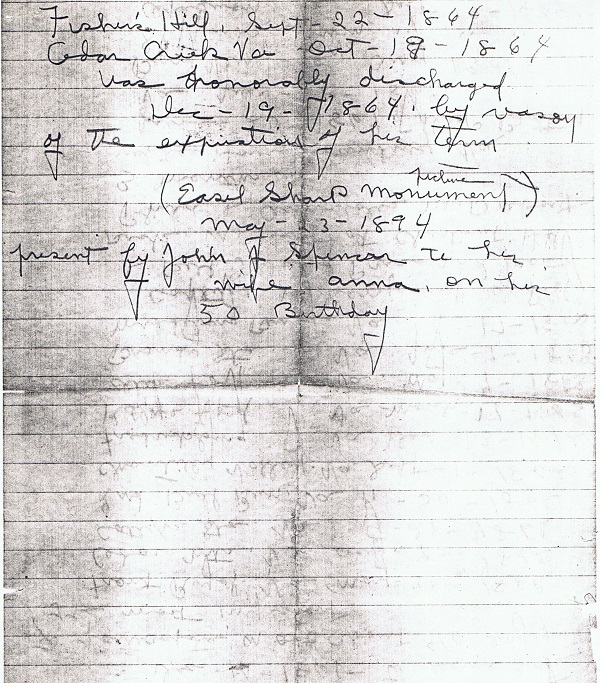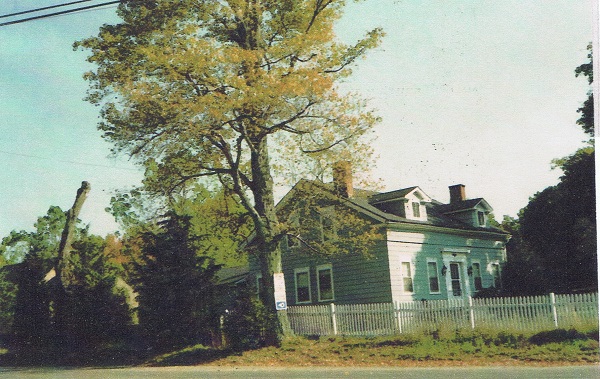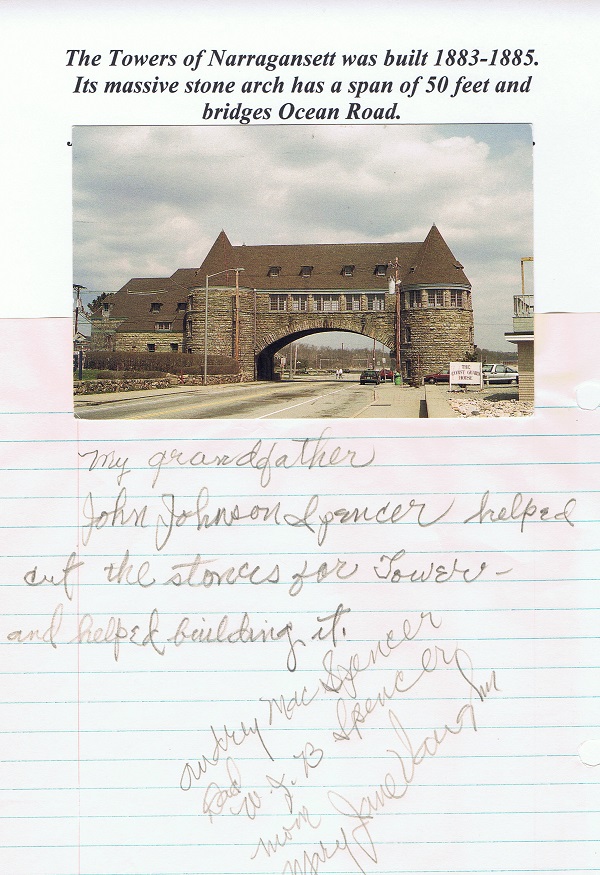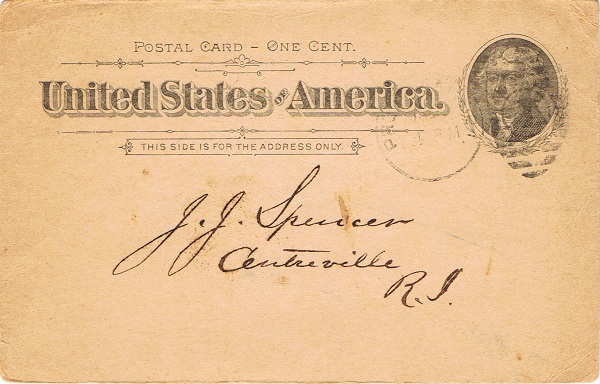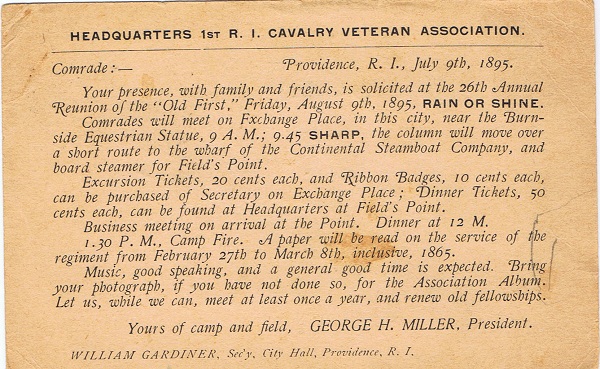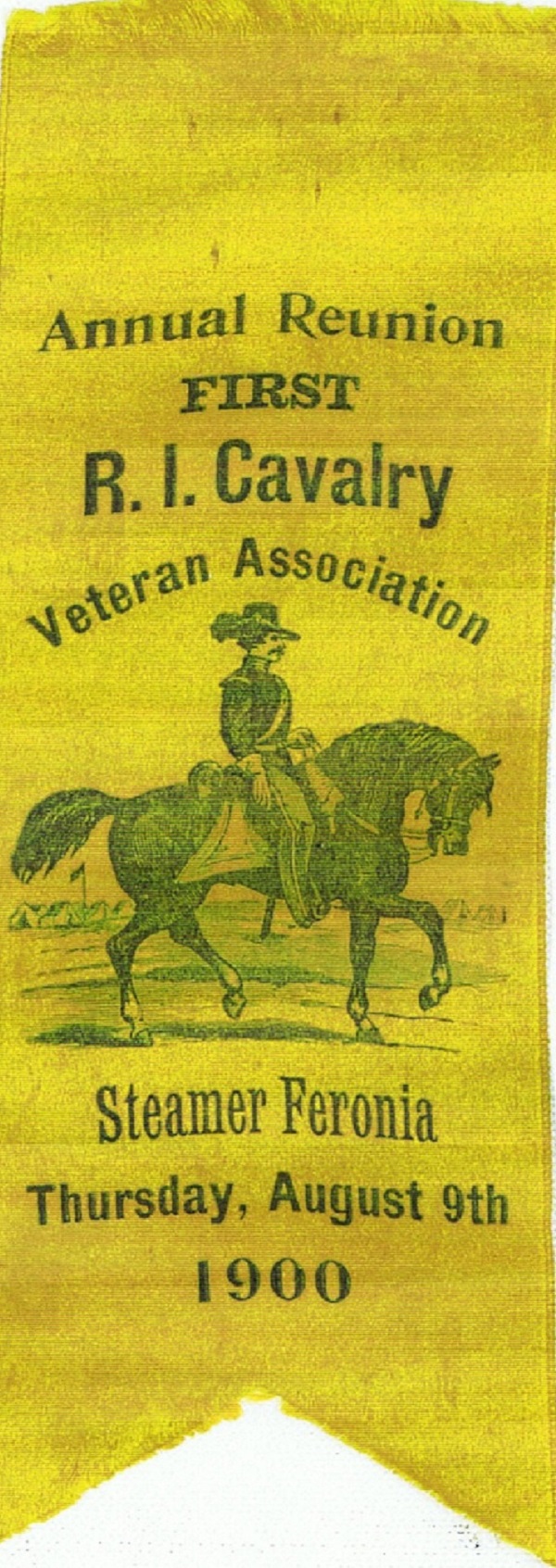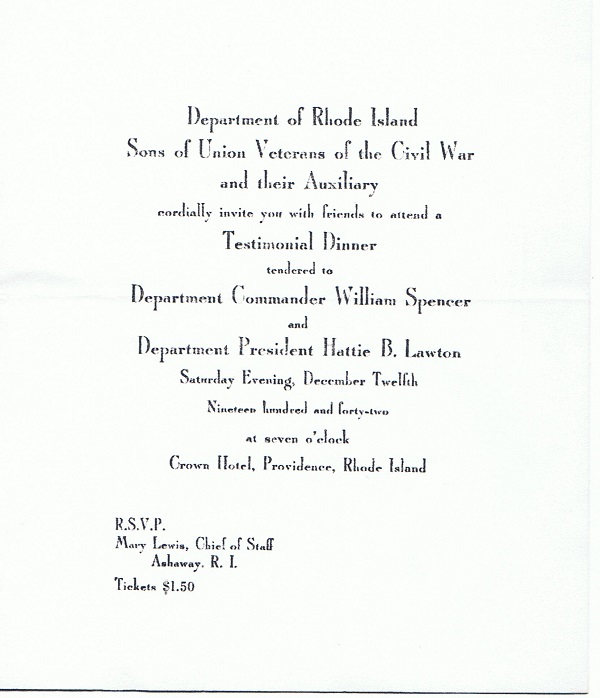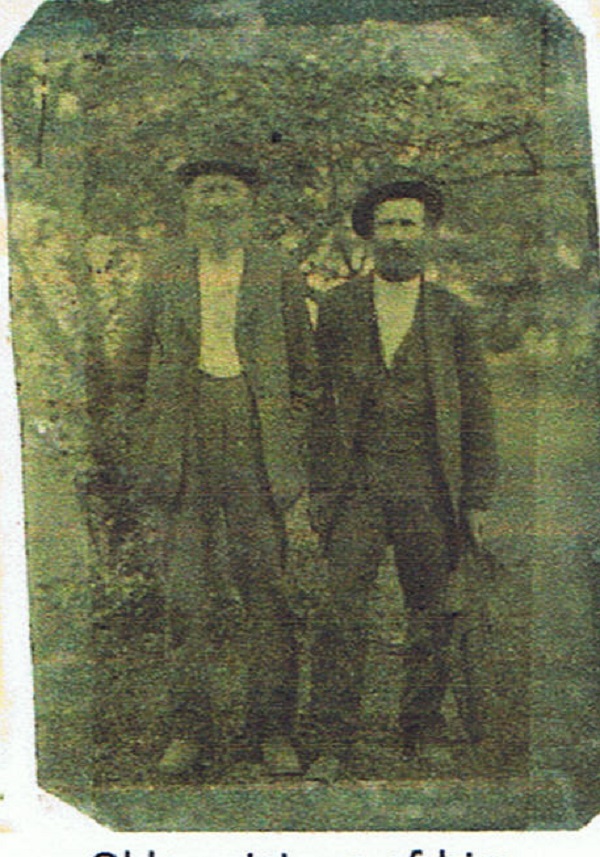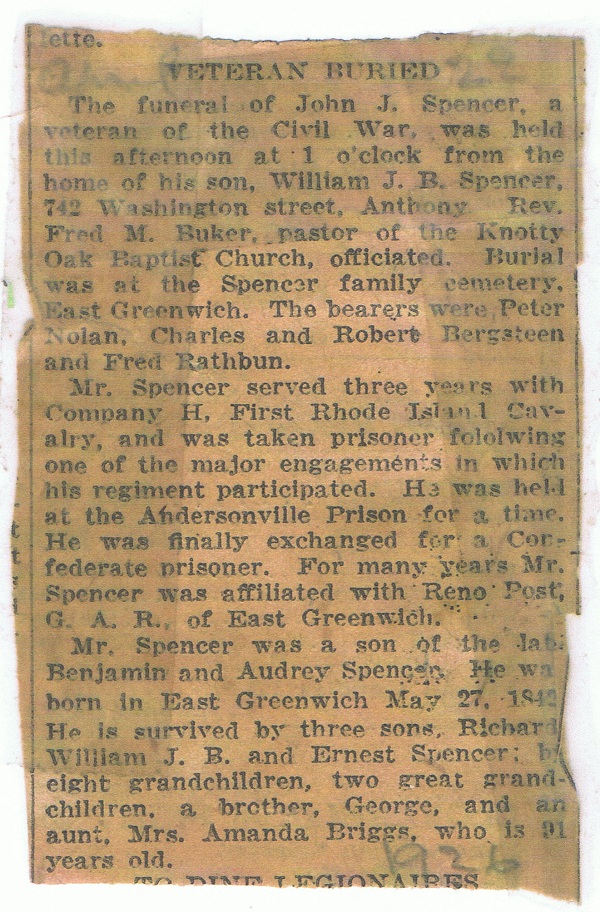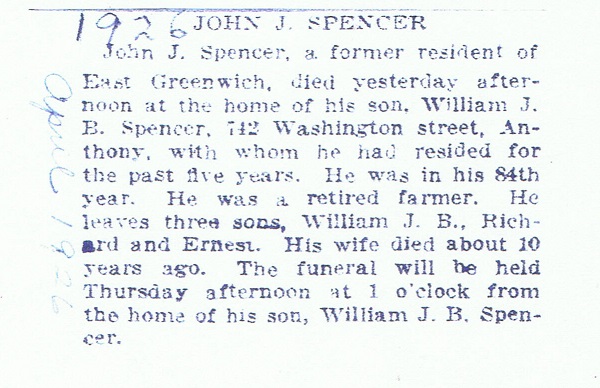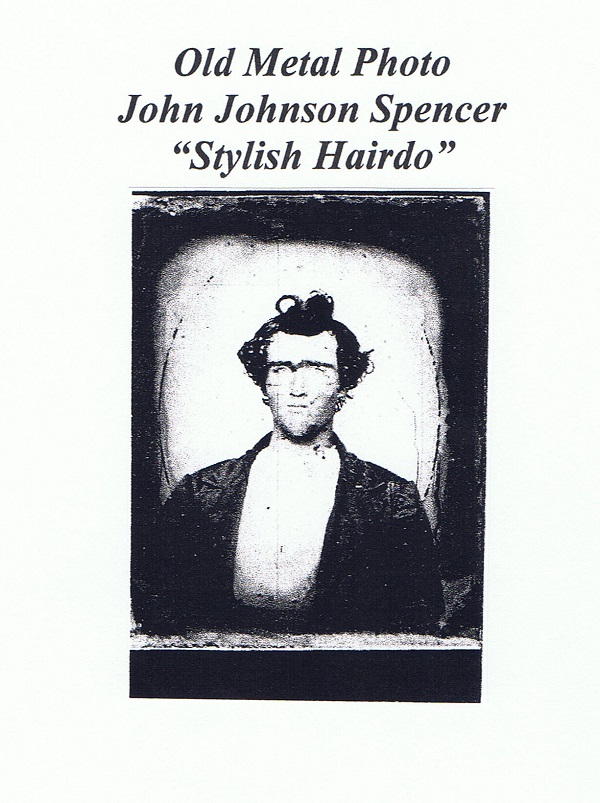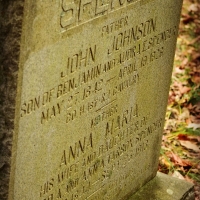 According to Audrey Mae’s artistic cemetery map diagram and Audrey Mae’s gravestone numbering system, John Johnson Spencer’s gravestone is Gravestone Number Eight. He shares this gravestone with his wife, Anna Maria (pronounced Mar-eye-ah) Spencer. Anna Maria and John Johnson Spencer are Audrey Mae’s, Edith Anna’s and John Edward (“Ed”)’s paternal grandparents. A Civil War stake and flag is by John Johnson’s gravestone. John Johnson Spencer was a private in Lt. Greene’s Co.,1 Reg’t New England Cavalry, which later was known as Co.H,1 Reg’t R.I. Cavalry. Using her Smith-Corona typewriter in the 1980s, Audrey Mae typed the following mini-biography of John Johnson Spencer, an eighth-generation Spencer in East Greenwich, Rhode Island.
According to Audrey Mae’s artistic cemetery map diagram and Audrey Mae’s gravestone numbering system, John Johnson Spencer’s gravestone is Gravestone Number Eight. He shares this gravestone with his wife, Anna Maria (pronounced Mar-eye-ah) Spencer. Anna Maria and John Johnson Spencer are Audrey Mae’s, Edith Anna’s and John Edward (“Ed”)’s paternal grandparents. A Civil War stake and flag is by John Johnson’s gravestone. John Johnson Spencer was a private in Lt. Greene’s Co.,1 Reg’t New England Cavalry, which later was known as Co.H,1 Reg’t R.I. Cavalry. Using her Smith-Corona typewriter in the 1980s, Audrey Mae typed the following mini-biography of John Johnson Spencer, an eighth-generation Spencer in East Greenwich, Rhode Island.

John’s gravestone inscription has his date of death as 4-19-1926. However, Audrey Mae’s mini-bio above has his date of death a year earlier. Audrey Mae was an artist, not a typist by trade. 🙂
To distinguish this John Spencer from the other John Spencers, he was always called John Johnson Spencer. Aunt Mandy’s notebook has him also being called “John Ace”. His grandmother was Huldah (née Johnson) Spencer (gravestone No.1). So Johnson is a family name. John Johnson was the son of Audra Eleanor (gravestone No. 53) and Benjamin (gravestone No.54) Spencer. John Johnson Spencer has two brothers, William Anthony (gravestone No. 23), Richard Benjamin (gravestone No.52) and a sister, Evelyn Augusta (gravestone No. 57) who are buried in the Spencer Family Cemetery.
- John Johnson Spencer, Lt. Greene Co.,1 Reg’t New England Cavalry-American Civil War
On December 10th, 1861, John Johnson Spencer enlisted in Lt. Greene’s Co., 1 Reg’t New England Cavalry. This Company’s name was later changed to Company H of the 1st Rhode Island Cavalry. He brought his own horse with him when he went into the Civil War. He obviously was an excellent horseman growing up on one of the Spencer farms as his rank as Private in the Civil War included his classifications as Farrier, Teamster and Blacksmith. According to Harold Barker’s History of the R.I. Combat Units in the Civil War “The history of the first Regiment R.I. Cavalry in the Civil War lists 56 encounters with the enemy. Some of these encounters were major engagements while others were the results of skirmishes and raids. This is understandable as the mission of Cavalry included acting as a covering force for the main body, reconnaissance patrols and raids. The bulk of the Regiment’s service was the Cavalry force in the Army of the Potomac. In reading the history of this unit one is impressed with the rather large number of prisoners taken by the enemy. This was the result in part by the number of patrols on picket duty and skirmishes made by small detachments.”
John Johnson Spencer’s military records at the National Archives:
- Dec. 14, 1861 muster-in
- Feb 28, 1862
- Mar-Apr, 1862
- May-June 1862
- July-Aug 1862
- Jun3 30 to Dec 1862
- Jan-Feb 1863
- Mar-Apr 1863
- Apr 10, 1863
- May-June 1893
- July & Aug 1863
- July & Aug 1863
- Sept & Oct 1863
- Sept & Oct 1863
- Nov & Dec 1863
- Nov & Dec 1863
- Jan & Feb 1864
- March & April 1864
- May & June 1864
- July & Aug 1864
- Sept & Oct 1864
- ” ” “
- ” ” “
- Nov & Dec 1864
- Dec 19, 1864 muster-out
National Archives and Records Administration, Washington, DC 20408
The Nat’l Archives and Records Administration have John Johnson’s rank as Private & Blacksmith. “In the line of duty at Manassas, Virginia on or about 7-15-62 he was pulled from his horse & injured: Injured across the small of his back”. Also “About the month of Sept 1863 at Annapolis, he contracted Typhoid fever & since which time, he has been troubled with severe pains in back & abdomen”.
The Civil War Library and Museum (America’s Oldest Chartered Civil War Institution) in Philadelphia, Pennsylvania has the following information on John Johnson Spencer: “John Johnson Spencer, Residence: West Greenwich, Rhode Island, 1st Regiment Rhode Island Cavalry, Private, Company H, December 11,1861 Enrolled, July 1962 Absent sick at Washington, D.C., June 18, 1863 Taken prisoner near Middleburg, Virginia, Subsequently paroled. Exchanged, October 1863, Absent sick in General Hospital, and bourne as absent sick until January 1864, May 28, 1864, detached for service at Gen Abercrombie’s Headquarters, August 1864, absent sick and so bourne until Dec, 1864, Dec 19, 1864 mustered out”. A energetic researcher at the Library, who was helping the web author’s husband find information, showed him the huge binder which included information on John Johnson Spencer. These binders were so old and fragile that no copies could be made from the pages, but Chuck, the author’s husband, could hand copy the above information from the very old papers in one of the many binders. The researcher said John Johnson was “mustered out 12-19-1864 because he was sick. That was 3-4 months before the war ended.”The author doesn’t find that written elsewhere about mustering out because of sickness, but John Johnson Spencer was sick the rest of his life from his war experiences so that is no surprise that the researcher said that.
Audrey Mae knew that her grandfather, John Johnson Spencer, was captured and sent to Libby prison in Richmond, Virginia where he had to eat uncooked pork. This caused him to have stomach problems for the rest of his life. Allan Nevins’ book War for the Union mentions “the Union captives in filthy Libby prison”. One of Audrey Mae’s grand nieces, Luane (née Cahoon) remembers hearing from her mother and a grandparent that her great grandfather, John Johnson Spencer, was also at Belle Isle Prison. According to Luane’s research on the internet “Belle Isle was a holding place for all the prisoners that went in or out of Libby Prison.” Luane was told that her great grandfather “enlisted to serve three years. He participated in many engagements. The most important were Front Royal, Virginia (May 30, 1862), Cedar Mountain, Rappahammock Station, Virginia (August 23), Chantilly, Virginia (Sept 1862), WhiteHouse Landing (June 20) and ____Creek (October 19).” Luane had been told that her great grandfather had been captured and was “confined in Libby Prison for some months.”
Another source was Edith Anna (née Spencer), John Johnson Spencer’s granddaughter, who wrote that her grandfather was at Belle Isle Prison in addition to Libby Prison. Belle Isle prison was in the Richmond area of Virginia.
Descendants know that John Johnson Spencer was captured near Middlebury, Virginia and became a Yankee prisoner of war in June of 1863. Descendants also know that he was held at Belle Isle and Libby Prisons in Richmond, Virginia. His obituary stated he was at Andersonville, Georgia but his descendants doubt this. (see news clipping at end of this page.) Fortunately, John Johnson Spencer was paroled by Abraham Lincoln’s prisoner exchange program. He was exchanged for a Confederate prisoner before the program was abruptly ended. The South would not exchange the Black union soldiers, so Lincoln gave the South an ultimatum: either have the Black union soldiers in the exchange program or the program will be stopped. The parole program ended.
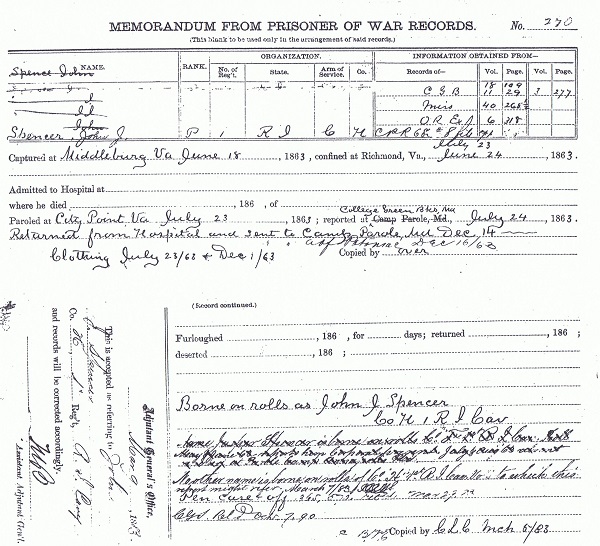
National Archives & Records Administration, Washington, DC Captured at Middleburg, Confined at Richmond, Paroled at City Point, Reported at College Green
According to his detachment Muster-out Roll, John Johnson was honorably discharged December 19th, 1864. Even with his injuries, sickness and capture he still completed his three years in the war and was able to go home. With over 500,000 men dying in the Civil War, he was very fortunate to have stayed alive even if that meant being ill for the rest of his life. Irregardless, he still labored long and hard on the farm all the rest of his life as a typical Yankee would do. He lived to age 82 years! Yankees would not complain or give in to sickness or ill health but would labor on through the pain. Yankee stoicism is very prevalent even to this day.
Nearly seven years after his discharge from the military, John Johnson Spencer married Anna Maria (pronounce Mar-eye-ah) Spencer on August 13, 1871. The wedding ceremony was performed by the Reverend George Northrop in Exeter, Rhode Island.
Audrey Mae wrote a connecting “M” to the left of John Johnson and Anna Maria’s mini-biography to show that both husband and wife are buried in the Spencer Family Historical Cemetery. See below:

Anna Maria (pronounced Mar-eye-ah) and John Johnson had three sons, Richard Augustus, William J.B. and Alfred Ernest (“Ern”) Spencer. John and Anna Maria raised their sons at the Spencer house on Spencer’s Corners (Division, Crompton and Shippeetown Road intersection of East Greenwich, R.I.)
John and Anna Maria’s middle son, William J.B. Spencer, at age twelve, no longer lived with his parents and brothers in this Spencer house on Spencer’s Corners. He was sent to live with his great-uncle William Augustus (“Gus”) Spencer’s family on Middle Road in East Greenwich, Rhode Island. He would work the farm with his great-uncle and thereby inherit the land. His great-uncle “Gus”, the sixth child of Richard Anthony (“Deacon”) and Roby (née Tarbox) Spencer, had no male heirs. (Author’s note: Needless to say, there was no love lost between the older uncle and his young nephew and given the situation, one can understand why. There was fifty years difference in ages between older great-uncle and young nephew. Besides, inheriting land would not mean much to a twelve year old boy in 1890. To inherit the land, he had to leave his parents, brothers, his own family farm and home life as he had known it for the first twelve years of his life. I doubt William J.B., the middle son of John Johnson and Anna Maria (Mar-eye-ah), was given a choice.)
Oral tradition carried through Audrey Mae gives us the story of John Johnson’s work back on the farm after the Civil War. Audrey heard tell of how very proud the family was of John Johnson cutting the stones for the Towers at Narragansett. With his horses and wagon he would transport the stones to the construction area where he also helped build the Tower. Oral tradition has it that the stones that he cut were superior and the speed that he could get these stones to the construction area was also exceptional. Audrey Mae’s quote “He quarried with a star drill granite from Carr’s Pond and hauled granite by team to Narragansett. He was very proud of his team and would pass others going up hills.”
John Johnson Spencer was involved with the Rhode Island Cavalry Veteran Association. The following post card was mailed in 1895 with a one-cent postage. The post card was found in the possessions of John Johnson’s granddaughter, Edith Anna, after her death in December 8, 1991.
John Johnson’s great-grandson Spencer MacDonald displays the following Annual Reunion First R.I. Cavalry ribbon framed on the Memorial Wall in his house in Rhode Island that honors his ancestors:
John Johnson Spencer’s middle son, William J.B. Spencer, was active in the Sons of Veterans Association for many years.
Audrey Mae (née Spencer) Mac Donald was twelve years old when her grandfather died at age eighty-two. She always remembered him as a quiet grandfather who seldom spoke. He lived with her parents until he died, which was the custom at that time in history, when children cared for elderly parents.
When John Johnson Spencer tried to get his government pension as an old man, he was at first denied because of a government mix up about his exact age. The fact that the National Archives & Records Administration have him mustering-in at age twenty (20) and mustering-out three years later at age twenty (20) could have something to do with this mix-up. (Author’s Note: Perhaps this led to his solemn demeanor. He was sick for the rest of his life from his fighting, his being a prisoner of war and his “living” conditions in the Civil War, and then for the government to initially refuse his well-earned pension was a bit much, to say the least.)
Then to add insult to injury, the government kept sending his checks after he died. In his pension records are letters from his eldest son and then from his middle son’s wife who were sending back the checks to the government.
John Johnson Spencer’s obituary in the newspaper records him as being at Andersonville Prison in Georgia, but the descendants doubt this.
Perhaps the only prison that was well known in Rhode Island was the horrific Andersonville Prison, so when the newspaper reporter knew that John Johnson Spencer had been in a confederate prison, he just surmised that it was Andersonville Prison in Georgia. In 2002, one of Audrey Mae’s daughters, skeptical about the Andersonville prison in John Johnson Spencer’s obituary, called Andersonville Prison Museum in Georgia. They have no record of her great-grandfather, John Johnson Spencer, being a prisoner there, but requested hearing from her if she was able to find any evidence that he was there. Descendants have found no information, outside of the newspaper obituary, that he was ever there.
Another news clipping of John Johnson Spencer’s obituary (Newspaper Name and Date not attached):
Five John Spencers from East Greenwich, Rhode Island fought for the union in the Civil War. Civil war records confirm that two John Spencers were killed and three John Spencers returned, one having been a prisoner of war.
“Spencer, Johnson, Goff and Tarbox descendants, if you have any additional information on John Johnson Spencer of the Civil War period, please add a comment to this web site and the web site editor will add this to the site. Thanks.”

